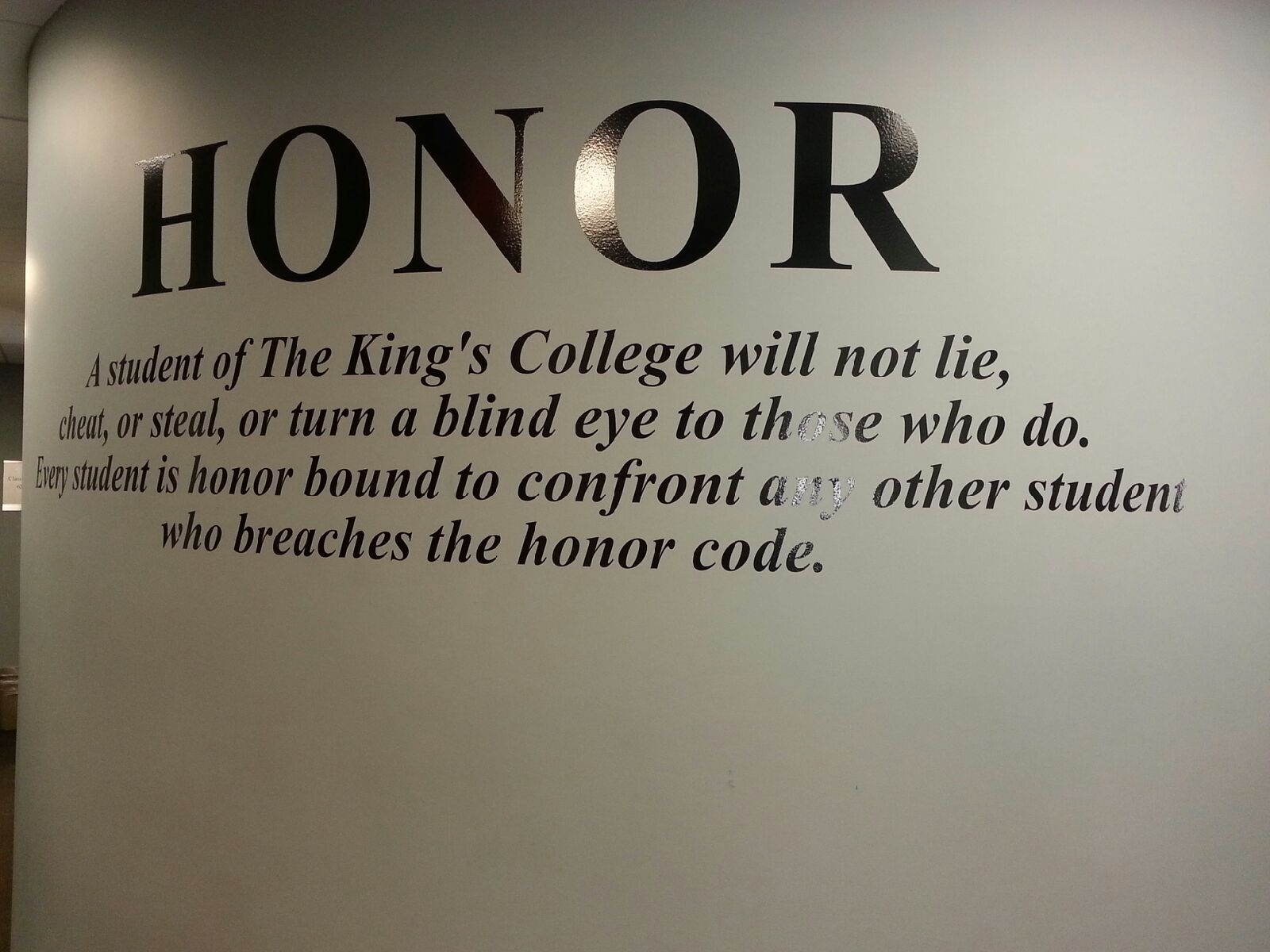The ambiguity of the Honor Code
“Every student, faculty and staff member makes a public pledge to uphold the Honor Code and shared community expectations outlined in the Student Handbook. This pledge is signified in their signing the Honor Code during New Student Orientation.” (Student Planner, Community Standards of Conduct, p. 29)
The Honor Code states:
A student of The King’s College will not lie, cheat, steal or turn a blind eye to those who do. Every student is honor bound to confront any other student who breaches the Honor Code.
After reviewing the Honor Code cited in our Student Planner during my freshman year, I came to the conclusion that I was misled—our Student Handbook works simultaneously in partnership with the Honor Code. Upon my arrival to Kings, I was under the impression that our Honor Code was an assessment of one’s character. I was not even told that our school rules could be found in the Hand Book—I discovered that on my own. Recognizing that every academic institution has rules, though ours tends not to portray its standards that way, I began to analyze the foundation of the Honor Code.
Each student makes a public pledge to uphold the Honor Code. For most of our students, this pledge takes place at their Convocation ceremony during New Student Orientation (NSO). I have had hands-on experience with the past three NSOs—I participated in the 2012 Spring NSO as an incoming freshman, the 2012 Fall NSO as a Student Services Representative, and the 2013 Spring NSO as the NSO Co-Coordinator.
At no point in any of these three NSOs was there a direct and explicit discussion of the “shared community expectations outlined in the Student Handbook” (Student Planner, Community Standards of Conduct, p. 29). If anything, I remember the repeated statement, “Here at King’s, we have no rules.” Why does this pose a problem? Because students are expected to follow the Honor Code and the rules of the Handbook.
When I was planning the 2013 Spring NSO, I was reminded of a form that students must sign before attending King’s. This form is known as “The Honor Statement,” which plainly outlines the relationship between the Handbook and the Honor Code.
The Student Statement to the Dean of Students states:
“I have read this document and understand that I am expected to abide by the Honor Code and by standards specified in the Student Handbook. As a member of The King’s College community, I am prepared to assume responsibility for these expectations, to call my fellow students to do the same.”
After realizing that the relationship between the Handbook and the Honor Code had once been communicated to me, I was satisfied. However, that satisfaction was short-lived. Before writing this article, I discussed the influence of the Honor Code with students from each grade level. It shocked me to learn that even some seniors do not understand the unequivocal relationship between the Handbook and the Honor Code.
Moreover, every freshman I spoke with did not recall the “Honor Statement” I was referring to unless I gave them a reminder. One freshman expressed her concern that incoming freshmen were not even provided access to the contents of the Student Handbook before signing the Honor Statement and, therefore, were not even aware of the expectations King’s has for its students. Though the handbook can be found online, the Honor Statement cannot be. It is interesting to think that the very document that depicts our pledge to abide by both the Handbook and the Honor Code cannot even be found at our leisure.
I have learned that most TKC students have a refined understanding of the relationship between the Handbook and the Honor Code. By this, I mean students become aware of their pledge to the Honor Code and the Handbook through experience and/or rumors. Why is this the case if the students signed the Honor Statement the summer before coming to King’s?
Perhaps it is because we have done a poor job communicating to students what we really expect of them. But isn’t that a crazy thought? Especially since our Honor Code is painted on a wall on the sixth floor—in a font large enough for a fly to read?
Perhaps King’s staff and administration should not be afraid to use the word “rules.” Or maybe the future student body president, student life staff, and dean should remind students of their responsibility to uphold the student handbook in addition to upholding the Honor Code at future convocations. The admissions department should be more intentional about relaying the relationship between our Student Handbook and Honor Code to prospective King’s students at Inviso.
I have found that, without the Honor Code, there is no way to enforce the Handbook (especially disciplinary action steps), and without the Handbook, the Honor Code is without consequence. So it is fair to say that we need both. But it is also true that most students don’t understand the requirement for submission to the Handbook. That is because we introduced the expectation to them by mailing an extra piece of paper for them to sign one month before they arrived on campus. However, that piece of paper is one of the most important King’s documents any student will sign other than the Honor Code itself.
We ought to shed more light on the Handbook as it stands hand-in-hand with the Honor Code. I am sure the majority of King’s students will agree that in most cases, our Honor Code is made out to be more important than our Handbook. In reality, they are equally significant.


